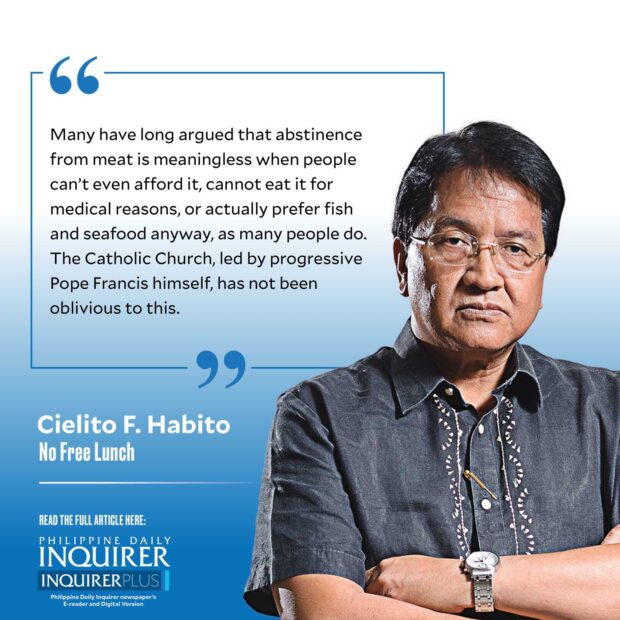Holy Week reflections

Where are you going next week?” was a question I got asked several times by different people last week, implying an expectation that I would be traveling somewhere with the family. I must confess to some discomfort about getting asked that question whenever Holy Week approaches, as my answer would normally be a simple “We’re just staying home.” The discomfort comes from not wanting to come across as either boring or sounding holier-than-thou to friends for whom going to the beach at this time every year seems a matter of course.
Truth to tell, through most of my professional life, I’ve more often than not looked at Holy Week as my chance to catch up on a seemingly perennial work backlog. I think of catching up with work deadlines then as a productive form of penitence, although deep in my heart, I feel it’s not exactly right either. In my early childhood, I remember the days from Holy Thursday until Easter Sunday as a completely “dead” period: everything was closed, TV screens were blank, radio stations were off the air, and there were no newspapers. In our family, we grew up with the admonition that “Bawal tumawa, patay ang Diyos” (don’t laugh or smile, because God is dead) all the way until Easter Sunday. Our pious father would gather the family around the living room on Good Friday to read passages from the Bible. And as children, we siblings dreaded having to sit through the seemingly endless church rite in the afternoon, where a drab clapper replaced the musical tone of the altar bells, and purple cloth covered all the figures.
Holy Saturday or Black Saturday used to be as “dead” as Holy Thursday and Good Friday. It was (and still is) the day favored for young boys entering puberty to be circumcised, supposedly on the belief that it would result in less blood than if done at another time. And like on New Year’s Eve, it was (and still is) believed that children could grow taller if they jumped as high as they could in the morning before the church bells toll. Folk beliefs aside, the solemnity that used to be accorded to Black Saturday (more positively termed “Sabado de Gloria” in Filipino) was all but gone by the time I was in college in the 1970s. Unlike in my younger years, shops, malls, and movie houses would reopen by then, as they routinely do now, never mind that as our old folks used to admonish, “patay pa rin ang Diyos” (God remains dead).
It’s understandable that Holy Week holds little significance in most other countries, especially those that are non-Catholic, and Holy Thursday and/or Good Friday are not public holidays, including in—guess what—Italy and Vatican City itself! (On the other hand, Easter Monday is a public holiday in Italy and the Vatican, and in other countries like Australia, Canada, Germany, and New Zealand.) Still, the Philippines remains one of a few countries that accord such public importance to the Holy Week, and observe the solemnity thereof. Christians, especially Catholics, are supposed to see it as a time for reflection and penance, and Easter as a time for renewal. This is where the common practice of going to the beach or resort during the Holy Week holidays would appear to collide with religious values, especially in this country that counts 85 percent of its population as Christian, with 79 percent Roman Catholic.
Would hitting the beaches this Holy Week break run counter to one’s Christian faith? Would Catholics be sinning if they ate meat and failed to fast on Good Friday, or failed to abstain from eating meat on the previous Fridays of Lent? Many have long argued that abstinence from meat is meaningless when people can’t even afford it, cannot eat it for medical reasons, or actually prefer fish and seafood anyway, as many people do.
The Catholic Church, led by progressive Pope Francis himself, has not been oblivious to this. I find a message attributed to Archbishop Socrates Villegas making the social media rounds to be on point. Among other things, he says: “Fasting is good, but without malasakit (concern) for others, it is nothing. Prayer is good, but without remembering others and laying aside personal comfort, it is just an ego trip. Helping the poor and giving alms are good, but if you do it for show or to get a ‘feel good’ reward later, it is just a noisy bell … Can we go to the beach during Holy Week? If it will help you love like Jesus, yes, you can … The highest law is not silence but love. Silence speaks only if that silence is loving … Must the face look sour and gloomy during Holy Week? Love begins with a smile. Make someone happy this Holy Week. Make someone feel loved. With your smile, show that God is love.”
Just as I ended writing this, a family member messaged that they were leaving for Bali to spend the week there. I know their Holy Week need not be any less blessed than ours.
cielito.habito@gmail.com




















